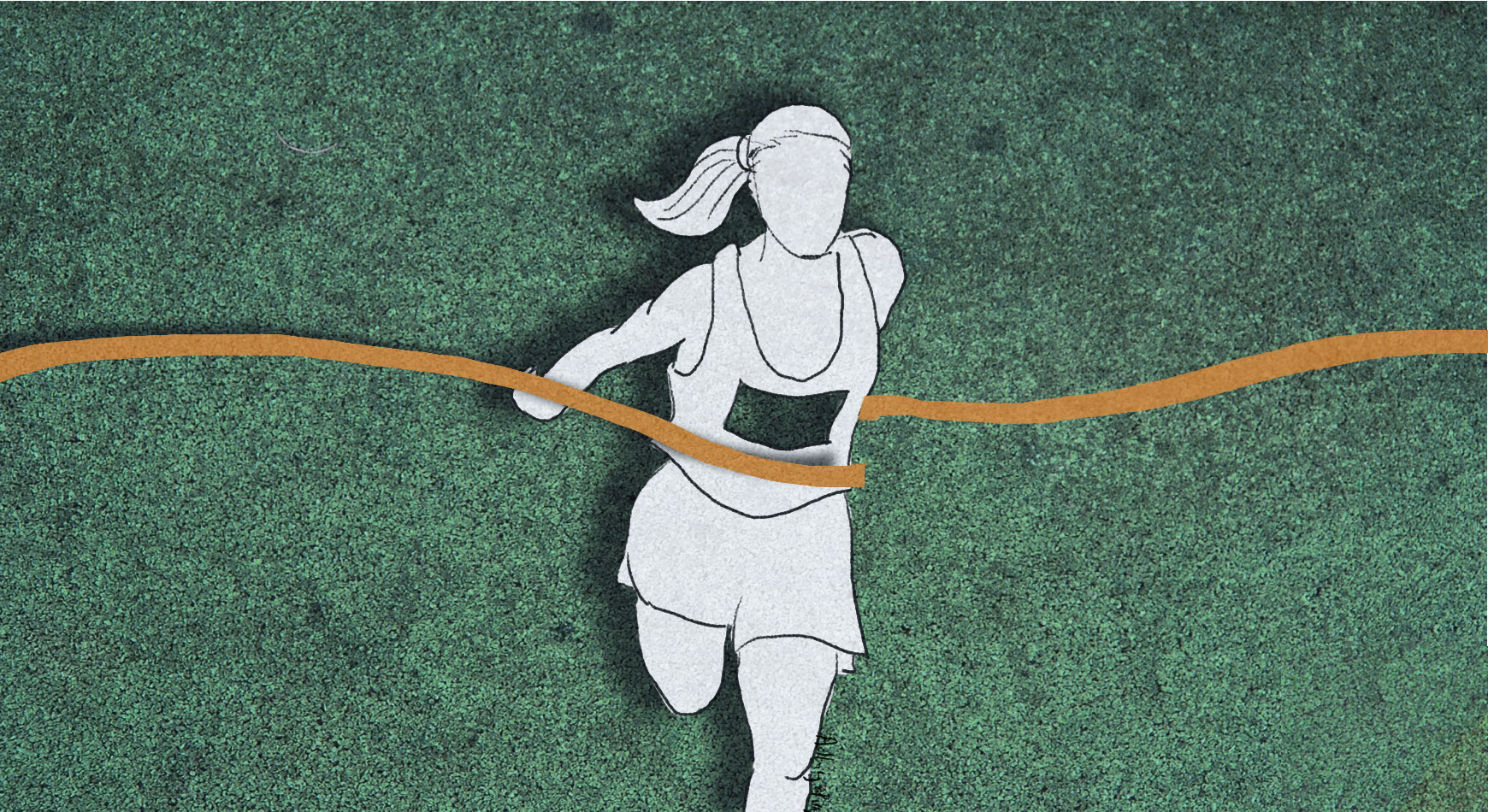Completing a triathlon is one of those things that's been on my bucket list for years.
As a teenager, I was a competitive swimmer who spent hours in the water. But there was something about the swim, bike, and run combination that appealed to me – or specifically, challenged me.
I finally signed up for my first-ever sprint distance triathlon, seven weeks before race day. I was feeling inspired after watching a reality television show (of all things!) where an overweight woman trained six months to complete a standard distance triathlon. I was feeling rather impulsive that evening, and perhaps a little overconfident, rationalizing to myself that since I worked out regularly and wasn't overweight, I could complete my first tri in less than two months!
So I registered on the spot, paid a fee, and went to sleep. And I was sober, mind you.
But I think I woke up with a headache the next morning.
You know, like those nights you wake up hung over and you're not entirely sure what you've done or why you did what you did the night before? When I woke up, I realized I had committed to completing a triathlon the previous night, despite not owning a bike, not having a set training plan, and never having swum seriously in open water (Boracay bathing not included)!
It turned out to be the best thing that happened to me.
It was signing up for a race that jumpstarted everything for me. Most online training plans for the sprint distance recommend three months. I had seven weeks. Signing up pushed me to just make it happen, to get everything I needed, and to just do it.
I completed my first triathlon last July 25 at the Singapore International Triathlon, but believe me, I don't want to have to remember the race and to write about the pain! Instead, here's a list of the best tips I got that made me enjoy the race and the entire experience – so much so that I'm considering a second, longer one.
1. Training is everything
I've read this in every book, blog and article about triathlons I've come across so I have to include it here now, on top, because it couldn't be truer: training is everything.
To be 100 percent clear, I don't recommend blindly signing up for a triathlon less than three months before race day. Although the act of signing up was the push factor, doing so at such short notice was a risk, and though I wasn't starting from scratch in terms of fitness levels, I remember thinking a week before my race that I wish I still had more time to train. I had done every single session from the training plan I got online, but I know even today that I would have performed even better had I trained a little longer.
But it's not just about completing training, its about training to replicate race day. One of the best tips I got was to "climatize". An athlete friend of mine made me look up my race start time, and when we found out it was at 9.30 a.m. – much later than I thought – he made me scratch my early morning and late afternoon trainings when weather was cooler, and forced me to train between 10 a.m. and 3 p.m., when the sun was at its highest.
I cursed him under my breath the first time I ran at noon and got goosebumps mid-run – signs of a heat stroke – but when the sun was in its full glory on race day, I felt confident having trained under similar conditions.
I finished my race well below my goal time, and ranked in the top half of my category which included elite athletes, so I was thrilled with the results. Training solo for my first tri was a challenge in itself, but not missing a day of training also meant I made a lot of sacrifices to make that happen, including waking up early during a vacation in Vietnam just to run, giving up alcohol, and dragging myself to the gym at 10 p.m. after a full day.
It sucked at the time, but knowing on race day that I hadn't missed a training session did a lot for me psychologically. I chose a training plan, stuck with it, and believed it was going to get me to the finish line. And it did.
2. Swim at least once in open water
About a week-and-a-half before my race, my aunt, a seasoned triathlete who lives in Texas, told me on Facebook, "There's a video on YouTube where a swimmer is being pounded with swim noodles by a horde of people – that's what the swim feels like! It's not like having your own swim lane in the pool."
And boy was she right. My strongest discipline is swimming but even during race day, I remember being surprised by the slaps and hits I received from fellow racers. She told me, "Since you're a swimmer, stay in front or to the side to try and avoid the people that panic in the water." It worked, but I got my fair share of hands on butt and back and face, and even a fellow swimmer's face an inch from mine every time I would take a breath (why hello number 618!).
Not to mention the jellyfish. I managed to survive training without an injury, but after my race, my forearms were covered with jellyfish stings. There was a jellyfish breakout where we competed and I say this not to discourage you, but to prove that open water swimming is a whole different animal from the pool. So if you can, it is critical to train at least once in open water, and ideally with a group of people, to get a sense of the chaos!
3. Get a bike that fits
For a sprint distance tri, you don't need a fancy, expensive race bike. A road bike or a mountain bike is fine for the 18-km distance – what's important is that it fits your height and it isn't too big or small for you. This is crucial. I was lucky enough to train and compete in an Orbea Aqua, a phenomenal bike that made me want to ride – but again, regardless of brand, it was perfect for me because of its size.
Another crucial thing when it comes to bikes: have it checked before your race. Make sure your brakes and gears and tires are all in top form. Knowing your bike is at 100 percent will not only make your ride smoother, it will also do wonders for you mentally. I never had a cycling trainer and literally only knew how to ride a bike, but I got all the help I needed for the race from a bike shop.
The boys at Soon Watt & Co in Singapore fitted my bike for me, made sure it wasn't too big, and that I was comfortable. They gave me riding tips and even installed pedals on my bike that forced me to bike with the pedal at the balls of my feet, which allowed me to conserve energy while riding. Their help was enough to get me through to the finish line.
A quick note about bike shops too: if you can, find one that specializes on your type of bike. Soon Watt & Co, for instance, are experts on Orbea. Because they knew my type of bike so well, when I called frantically a day before race day because of a squeaky sound, they told me it was just dirt and that it was normal, and that I didn't have to bring my bike in. They not only calmed my nerves and saved me a trip so close to race day, they were also right.
4. Build up
I got this tip several times from different triathletes. They worded it all differently but they all said the same thing: build up your pace throughout your race, so you don't burn out by the end. Get your breathing right during the swim, gain more steam during the bike, and give it all you've got on the run.
Another triathlete friend said it this way: "For every leg, start it slower than you feel you can and build your pace." And from my aunt, "Learn to run slow for a few minutes then turn it on after the bricks (the way your legs feel after the bike!) have fallen off."
The excitement and the adrenaline at the starting line can get you to start quicker than you anticipate. But it's important to save some for the later parts of the race. My fear was I would go too fast on the swim and bike that I'd be forced to walk on the run. It didn't happen thankfully, in large part because I was conscious about my pace, thanks to this advice I kept getting over and over – and which I'm now sharing with you.
5. It's all in the mind
I used the words "psychologically" and "mentally" several times, but perhaps one of the best, if not the best, reminder I got is that in the end, it's only you and the voices in your head come race day.
As important as physical training is, I've learned it's just as important to prepare yourself mentally for the race. Know that it's going to hurt and know that it's not going to be easy. Embrace the pain.
As soon as I got on the road for my run, I knew it was going to be one of the hardest runs I had ever done. My legs felt like rocks, and my lungs were so mad at me, it felt like it was literally going to explode out of my body. But that final leg, I survived by talking to myself.
I'm pretty sure I had an argument with myself throughout the run. A little voice in my head said I should stop running and just start walking because it would feel. So. Good! Another voice said if I started walking I would regret that decision much longer than the pain would last.
The mind is a very powerful tool, and regardless of the training you do, when that gives up – the strength of your muscles in every other part of your body will matter little.
So when it hurts really, really badly – remember, it's all in the mind.
This story was first published in Rappler.com, a Manila-based social news network where stories inspire community engagement and digitally fuelled actions for social change.








Comments